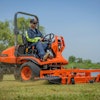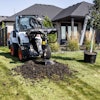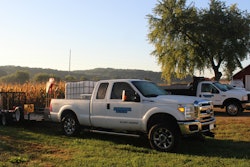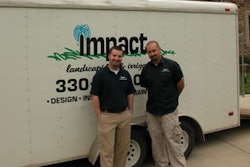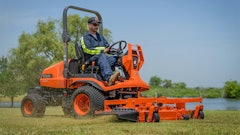In September 2008, Tim Emick decided to focus on making internal improvements in his company because, as this Colorado contractor so aptly states, there isn’t a thing he can do about the economy or his competitors.
Nowadays, with the economy showing signs of improvement, Emick is excited about what the next few years could have in store for his 27-year-old company, Timberline Landscaping in Colorado Springs, CO.
“We are starting to hire again,” Emick says. “We’re really focused on the customer service side, because staying in front of your clients is so important these days.” Timberline Landscaping currently employs 75.
For the past couple of years, the company has been focused on finding ways to tighten up operations without sacrificing quality. Timberline began the Working Smarter Training Challenge in September 2008 when Emick saw the market start to soften. Here are three areas where Timberline has been able to make dramatic, profit-boosting improvements.
Learn how you too can transform your company into a lean, productive and passionate organization that can continue to be competitive for years to come by visiting Working Smarter Training Challenge.
Organizing Crews
Getting crews out faster in the morning was something Timberline tackled immediately. “We put someone on the roof of the shop to videotape our yard routine,” Emick tells. “It was actually quite funny to watch, especially in high-speed; everybody running back and forth.” What wasn’t so funny was the money being wasted on downtime and unbillable hours.
After reviewing the tape over and over, and consulting his account managers and foremen, Emick determined that improving the morning dispatch was primarily a matter of improving the evening arrival.
“When crews come back to the shop in the afternoon, we now take extra steps to prepare for the next day by unloading excess waste, and loading up materials and equipment,” Emick says. This approach helps crews get on the road in a matter of minutes each morning. And since the laborious “housekeeping” tasks are handled at day’s end, when crews want to punch out and go home, they are handled quite expeditiously.
Mower blades are also changed at day’s end. “We set up blade changing stations in the yard,” Emick says. “We poured concrete pads, and installed ramps, air impact guns and grease guns. Blades are now switched out and the mowers fueled up in a matter of minutes; less than half the time it used to take.”
The mechanic works “second shift,” punching in as the crews start arriving each afternoon, working into the evening hours. That way any equipment that’s in need of repair can be ready for the next morning (if at all possible).
Financial Reporting
A second area where Timberline Landscaping has learned to work smarter is in financial reporting. “Many contractors go out and buy software, but the application of that software to its fullest potential is what matters,” Emick relates.
Earlier this spring, all irrigation techs were given laptops so they can take care of paperwork in the field and bill customers immediately. This has drastically cut down on the time admin support has to spend re-entering data.
“We also decided that we had to do a better job of running reports from our software system for both myself and my managers,” Emick says. “When we took the time to really investigate what the system could do for us, we realized that several reports could be set up to run automatically.
“A ‘work in progress’ report runs every Monday morning, which helps us quickly identify jobs that have been completed but not yet billed. Our admin person then follows up on these accounts.
“The ‘maintenance task codes’ report helps us manage things like mowing operations to ensure that man-hours are staying within budget for each job. We generate this report every Tuesday night so I can review it Wednesday morning.
“When we close out jobs, a report is sent to our vice president in charge of operations so he can make sure costs are not being assigned to those jobs any longer.
Saving 2% on Payroll
Another immediate impact has been made with respect to payroll. Timberline Landscaping has implemented electronic data collection for all of its timecards, which employees operate with a PDA. They simply log their time for each task and submit. The data syncs with the main computer back at the office, the manager approves it, and it goes right to payroll.
“What used to take an office person 30 hours a week to process payroll is now down to under 14 hours—plus it’s a lot more accurate because it has real-time data and GPS working with it,” Emick explains. “This will save us at least 2% of payroll.” The program Timberline uses is called mJobTime.
Commitment Required
Timberline has already completed its first 52-week run in the Working Smarter Training Challenge. “We’re now in phase 2,” Emick says. “We’re looking to continue developing ‘standard work procedures’ to train both new and current employees. We need our new employees in particular to understand how they perform a job, and why.
“We will also continue pushing education through our involvement in PLANET and the Irrigation Association,” Emick continues. “We have 20 employees just finishing their PLANET certification testing, adding to the 17 already on staff. We’re increasing our number of irrigation auditors from two to eight, and our number of backflow testers from two to eight. Four certified chemical applicators round out our field staff.”
Making these improvements has taken time and investment, but Emick says it’s necessary. “The negative effects that poor processes can have on morale is staggering,” he says. “A process done poorly costs you money, period.”

